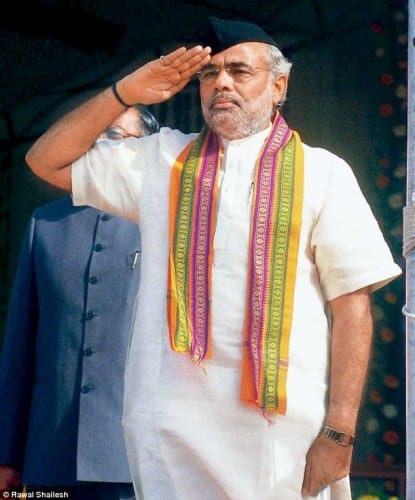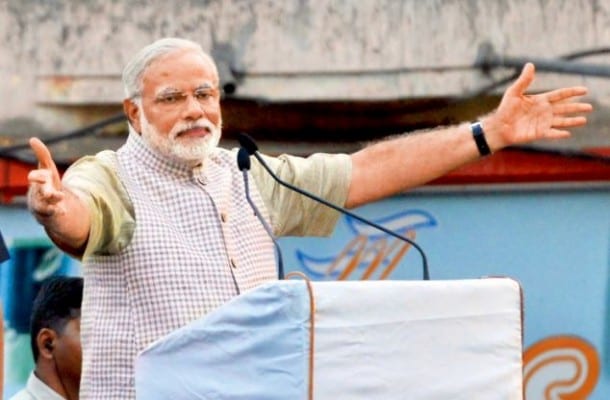Loved and loathed: Narendra Modi, India’s new Prime Minister.
Twelve years ago, a train containing Hindu activists heading for a protest at the site of a demolished mosque was set on fire in a small town in the Indian state of Gujarat.
The attack at Godhra killed 59 passengers, sparking vicious retribution against local Muslims. Mobs went on the rampage, raping hundreds of women and burning children after pouring kerosene down their throats.
Men were forced to watch their families tortured to death, then they too were slaughtered. About 2,000 people died and 200,000 made homeless over three nightmarish days.
Despite pleas for protection, Muslims were ignored by officials. As the blood flowed, the state’s newly-elected chief minister quoted Newton when he was asked about the carnage: ‘Every action has an equal and opposite reaction.’
No one was ever held accountable. But many Muslims, including the British relatives of victims, believe that chief minister has blood on his hands for inciting the savagery. Now this same man – banned from entering the US and shunned by British diplomats – has been elected India’s new prime minister after a landslide election victory.
Narendra Modi stormed to power yesterday, with results revealing the pro-business Hindu nationalist trounced the ruling Nehru-Gandhi dynasty.
After a six-week election involving 500 million voters, Modi’s opposition Bharatiya Janata Party took more than six times the seats of its closest rival. It was the most decisive mandate since the 1984 assassination of prime minister Indira Gandhi propelled her son to office.
It immediately led to a stock market rally and raucous celebrations among Modi’s supporters.
His rise is a remarkable story: the tea boy from a lowly caste who rose to lead the world’s biggest democracy. The celibate, yoga-loving technocrat, 63, has been swept into power by an electorate fed up with a stuttering economy, stifling corruption and state sclerosis.
Although his election success was anticipated, the scale of victory was a shock. Unlike recent Indian governments, the BJP will not be constrained by coalition – marking what his spokesman called a ‘tectonic shift’. For once, this was not election hyperbole.
After India’s most crushing triumph for three decades, Modi’s first comment was on Twitter. ‘India has won. Good times ahead,’ he told his four million followers, before visiting his 90-year-old mother to celebrate.
But given his history, there are fears this hardline Hindu nationalist will inflame tensions with India’s 180 million Muslim minority and its neighbor, Pakistan. The two have had four wars since the 1947 partition of India – and both have nuclear arms.
‘This could go either way,’ said one Muslim diplomatic source. ‘It could be a terrible result for the region – but equally, sometimes these extreme politicians become more pragmatic when forced to grapple with the realities of power.’
Sonia Gandhi, head of the Congress Party that dominated politics since independence, once called Modi ‘a merchant of death’.
But to his fans, he is India’s savior after the stumbling rule of Congress’s Manmohan Singh, a mild-mannered Sikh economist.
Singh last night looked set to win less than 50 of the 543 parliamentary seats at stake, a humiliation for the force that has dominated Indian politics in the 67 years since independence.
Claims that Modi would re-open communal wounds clearly failed to convince voters. Born to a family of grocers, Modi spent his childhood helping at his father’s rail station tea stall – a striking contrast to the privileged lifestyle of the Gandhi dynasty.
He is understood to have been forced into marriage at 13 to Jashodaben, now a shy, retired teacher. But his growing fascination with militant Hinduism made him determined to live as a bachelor.
In his teens he joined a banned extreme sect called Rashtriya Swayamsevak Sangh, which promoted ascetic living, charity work and military-style discipline. It was reportedly inspired by fascist movements in Europe.
Yet combined with skillful PR and self-promotion, he has built a power base that put him in charge of his western state for 13 years and now at the helm of his huge nation.
Modi, who rises at 5am each day for an hour of yoga, turned his arid state into India’s most business-friendly region. By building roads he was rewarded with rapid economic growth, boosting his image as an efficient administrator who focuses on hard work and eschews the flashy trappings of success.
He is fascinated by the rapid success of China, and his election campaign promoted an alluring vision of India freed of corruption and filled with bullet trains.
A technology lover, he appearing at rallies as a hologram. Critics say Gujarat has fared no better than other states, while making little progress on India’s grinding social problems.
An election official counts votes in Hyderabad. If the results are finalised as expected, it would be the first time a single party has won an outright majority since 1984.
Muslims, worse off than Hindus on most measures from health to poverty, complain of discrimination.
India has elected as prime minister its most divisive political figure, loved and loathed in equal measures. The hope is that this controversial character can shake off the stains on his reputation and drag his country into the shining future it deserves.
Yet the fear for many is that he may send his nation spiraling back into the darkest days of its past.






